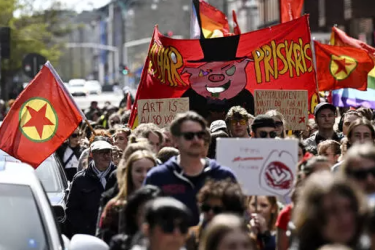Sweden

More than just an electoral upwind? Nordic left-wing parties after the EU elections
Record results for (Centre-)Left parties in the Nordic countries, with far-right parties losing ground. Ada Regelmann gives a sober assessment of the European elections results in Denmark, Finland and Sweden.

Sweden’s Left Party celebrates its biggest win in 20 year
John Hörnquist — After winning over 11 percent of the vote in June’s European Parliament elections, the Swedish Left Party Vänsterpartiet is celebrating its best election results in twenty years.

After the 2024 European elections: Rightward shift with slight headwinds
Cornelia Hildebrandt — The few successes cannot conceal the continued defensive posture of leftist parties in Europe and the existential crisis faced by individual parties.

The resistible rise of the far right in Europe
NPA Anti-Fascist Commission — A relatively large number of far right parties are now on the winning side in national elections, and are even taking part in national governments.

Hanna Gedin (Left Party, Sweden): ‘We need to give people hope’
An interview with Hanna Gedin from the Left Party (Vänsterpartiet) on the priorities and challenges of the Swedish Left ahead of the European elections.

Sweden: Assessing Socialistisk Politik and Internationalen’s position on the Russo-Ukrainian war
Jan Czajkowski — The war against Ukraine is not just one more political issue among others, where it is possible to have different opinions within the left. Rather, it is a watershed moment.

Sweden in NATO — And then what?
Jonas Sjöstedt — The Left is correct to oppose the military alliance, but must now stake out a position within it

Sweden’s four messy months of right-wing government
John Hörnquist — Why far-right populism won the Swedish election, but is making the right lose its credibility.

Sweden’s new government – a dystopian nightmare
Petter Nilsson - The political results of the Swedish election are in, and they bear all the hallmarks of a bad dystopian novel. The new government will be composed of the Moderates, the Christian Democrats and the Liberals, and – in all ways except appointed ministers – the far-right Sweden Democrats.

Left Party (Sweden) on elections: Right-wing coalition wins election by the narrowest of margins
With almost all votes counted from Sunday’s election, it looks like Sweden’s right-wing parties are set to take power with a razor-thin majority, ending eight years of social democratic government. For the first time, this conservative coalition also includes the far-right Sweden Democrats, who have emerged as the country’s second largest party, despite their roots in Sweden’s neo-Nazi movement.

Swedish left’s perspectives on the war in Ukraine
The Swedish left has come a long way since 2014. Though the tumultuous events that shook Ukraine that year never became a top priority for left debates in Sweden, the antifascist rhetoric mobilized by Russia did appeal to some. In March of that year, a near-fatal assault on a group of leftists in the city of Malmö by far-right activists galvanized the Swedish left around the antifascist cause.
